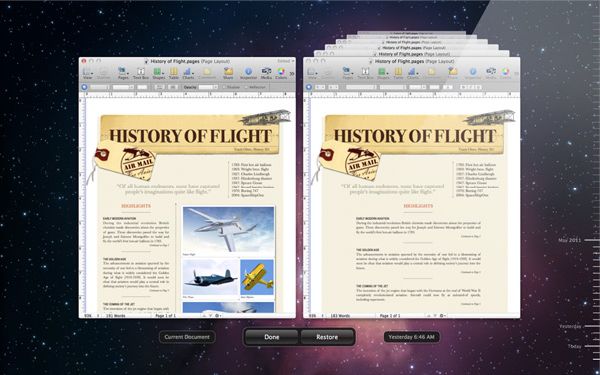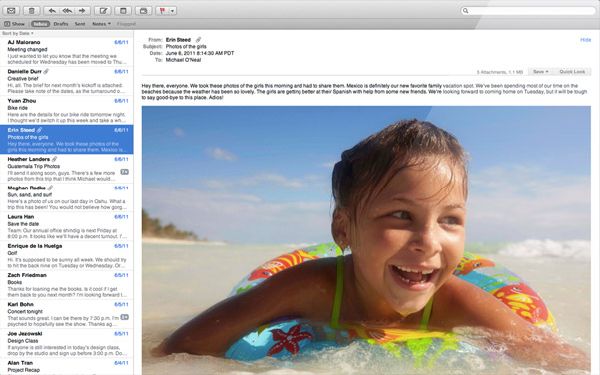Getting back on track, the sixth of our ten Lion features is Resume, a feature which allows everything from running programs to the OS itself to remember its last-used state when it's started up. This feature is said by Apple to be "system-wide," meaning that there should be literally nothing that can't be remembered and relaunched in the event of a system shutdown.
In the same spirit of automation, our next feature is auto-saving, which brings to OS X a Google Docs-like attitude toward saving documents: automatically and often, without the need for constant CTRL-S keystrokes or did-you-want-to-save-your-changes prompts. If you don't want a document to automatically save, you can opt out of auto-save by locking it. Apple only demoed this functionality with its own iWork products, but I assume that the APIs will be usable and that the more-widely-used Microsoft Office could take advantage of this service with a few tweaks.
Auto-save works with Versions, which uses a Time Machine-esque interface to allow you to view all past versions of a given document. This happens automatically as you work, though you can also manually save a snapshot of your file if you'd like. You can then compare past and current versions side-by-side, copying and pasting content from one to the other.
Our penultimate Lion feature is Air Drop, which aims to simplify the sharing of files between computers in close proximity. Apple claims that clicking the AirDrop icon in the Finder will automatically find any computer within 30 feet of yours. If the user on the other end accepts the transfer, it's moved over with no need to put the computers on the same network. This would certainly be useful for quick sharing of documents at a conference or something, though if you need to share multiple files with people over a great physical distance, I'd still recommend something like Dropbox.
The last feature Apple demoed was Lion's new Mail app - Mail has been pretty static since 10.4 or 10.5, so it's good to see it get a fresh, Gmail-flavored coat of paint.
In keeping with Lion's "back to the Mac" motif, Mail now more closely resembles its iOS counterpart: The left column is used to show your messages (with or without conversation view: your choice) while the right pane is now a full-height message viewing window. In addition, the new Mail offers search suggestions based on your terms (i.e., searching all messages for the month of March, finding messages from specific senders, and etc.).
Conclusions
These ten features are probably among the more visible in Lion, but keep in mind that Apple is always moving and changing around a lot of little things about Mac OS in between versions - we probably won't know everything about the operating system until we have it in-hand (figuratively, of course, since we have to download it now).
At first glance, I'd say that none of said changes are to the detriment of the platform: the iOS additions and multitouch functionality are generally only used where they'd actually make sense (with the possible exception of Launchpad, which seems a bit tacked-on at best and a way to make non-App Store apps less accessible at worst). You can still use a mouse and keyboard to get around, but I could see the additions to Lion making a touchpad preferable in some circumstances (there's something I never thought I'd say).
Other changes (like the Mac App Store) that attempt to alter OS X on a more fundamental level don't do so at the expense of more traditional functionality (like downloading and installing programs from anywhere you want). The file system is still there. If you have a favorite browser or program that chooses not to make itself available in the App Store, you can still install and use it. Knowing Apple, I don't feel comfortable saying that you'll always be able to do that, but that change isn't coming with Lion.
And that's all she wrote! Stay tuned for more on iOS 5 and iCloud, Apple's other big WWDC reveals, later today!












42 Comments
View All Comments
dac7nco - Monday, June 6, 2011 - link
Most Mac users will use the new App Store exclusively. Want a different browser or mail client than Apple's approved ones? NIMBY!-Steve Jobs
MySchizoBuddy - Monday, June 6, 2011 - link
thats upto the users isn't it.PeteH - Monday, June 6, 2011 - link
It's not like downloading and installing software from a website is hard. If what you're saying is that technologically illiterate users will use the default browser and mail client, well, that's pretty much how things are now.mesiah - Tuesday, June 7, 2011 - link
Although you say that jokingly, I don't think it is beyond plausibility for a future version of the OS to disallow the installation of non-app store apps. They already do it with their other platforms, and now that they are moving everything to their app store, I think it is just a matter of time.Tros - Tuesday, June 7, 2011 - link
Same argument as PeteH:The most content users stay within the walled garden of iOS. The most attempts I've seen at preventing jailbreak are usually when it's a vector for a worm.
realmike15 - Tuesday, June 7, 2011 - link
I think Apple realizes people don't want restrictions, look at their DRM-free catalog of music. However, based on what we've seen from iOS it's plausible that they may someday try to restrict OS X to Apple approved software via the App Store. If that happens, that will be my last day as an Apple customer. Right now I'm a Desktop PC - Apple Laptop guy, and quite happy with that choice.It's possible that Microsoft and Apple might try to push an App Store only approach some day. But even if that day comes, I don't see Google or Linux adopting such a harsh policy. Stand behind the little guys if you want to prevent things like this from becoming the norm.
dananski - Friday, June 10, 2011 - link
How would they differentiate between non-app store apps and programs people are developing themselves? I've read that you have to pay $100 to install your own iphone app on a physical iphone (which is why most software developers go for other phones). Surely Apple won't want to put people off writing programs on their Macs with a similar policy?Penti - Wednesday, June 8, 2011 - link
You already have other browsers in the Mac App Store. Why would most mac users even use it. It might be their only channel to buy software (not games)! But not the only channel for their software.burntham77 - Friday, June 10, 2011 - link
I use Safari on my iMac at work and I hate it. It's just not reliable. Firefox is still my favorite.Micheal Summers - Thursday, July 7, 2011 - link
This is suppose to be a upgrade yet the articles i have read about it doesn't really offers anything new. Read this article http://v12ntoday.com/news/news-news/apple-os-x-lio... and tell me if you find anything special about it.